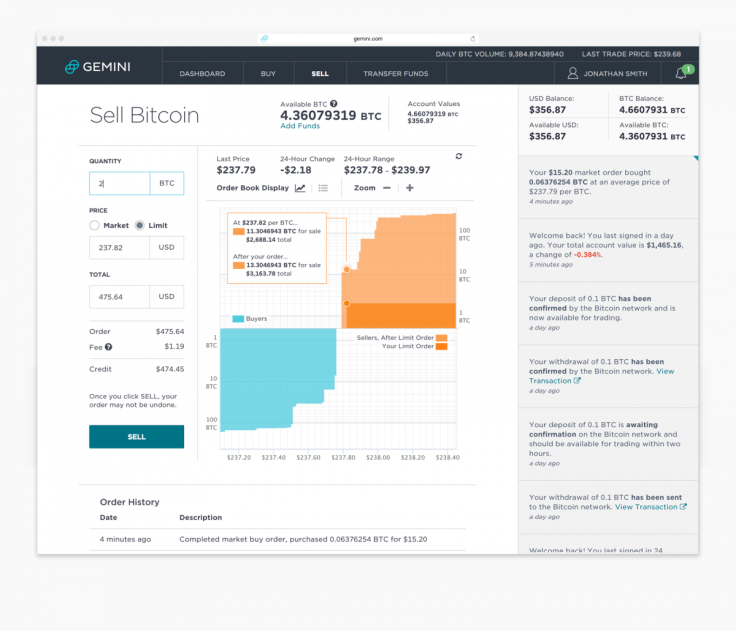Tyler Winklevoss: Gemini will have a positive effect on price of Bitcoin

Tyler Winklevoss, one half of the ownership of New York Bitcoin exchange Gemini, is hopeful its compliance conscious approach will provide an on-ramp for big blue chips and push up the price of Bitcoin.
He told IBTimes: "I think that if we can make good on our plan to build a great exchange that Wall Street can use, then I believe more institutional money that comes into Bitcoin and actually starts using it as a financial instrument should create positive price action."
Winklevoss said Gemini's belt and braces approach to regulation meant it was like the Depository Trust Company, E-Trade and Nasdaq all collapsed into one.
He said because Bitcoin is fixed and is truly scarce, supply and demand dictates that if more money comes into the ecosystem the network effect would be such that Bitcoin becomes more valuable.
"It's a self-fulfilling prophecy - liquidity begets liquidity and all of a sudden the markets are bigger and more mature and the more blue chip financial firms can start feeling comfortable getting involved.

"I think that there's a lot of potential for the price to go up. I don't have a crystal ball but the price could look totally different in the future; the current price would look completely like a steal."
"I feel like obviously the miners have a lot of downward pressure on the price because I would imagine they need to sell and reinvest back into their equipment. But I think that if there's enough new money that's not miners' coming in then there's a good chance that will empower a price movement."
IBTimes asked if Gemini could make any predictions about the volume of trading that could happen on the exchange.
Winklevoss said: "I wish I had enough data to answer that. I think our whole thesis all along has been that whatever the volume is for Bitcoin, it could be orders of magnitude larger if there were the correct on-ramps and gateways for the large players to get involved.
"Until Gemini there wasn't a bridge for these institutions to get into Bitcoin in America. So we are really at the first or second stage of the necessary infrastructure that basically the deepest pockets in the room can travel to and get involved in Bitcoin.
"We think that platforms like Gemini can be a catalyst to grow the market. So we are hoping to not just capture the existing market but also grow it much larger."
Gemini picked New York because it is the most progressive jurisdiction in terms of regulation (San Francisco was weighed up carefully because of its talent and tradition). But Winklevoss said that without the right banking relationship any business is dead on arrival.
Regulation and security
He pointed out that Gemini is not a Bitlicense company and has instead opted for the more robust regulatory regime of a limited trust company under New York banking law.
"We have higher capital reserves; our capital reserves are more like Basel III standards. Our AML programme is similar in that we have to meet as high a watermark as banking compliance. It won't feel somehow easier to get authenticated and onto our platform.
"In fact we think our methodology is actually superior to legacy banking onboarding KYC programmes. Uploading a document or someone meeting a teller face to face is in many ways a false sense of security. Having a physical touch point is not necessarily more safe than having better knowledge-based type testing. Documents can be easily forged.
"We use knowledge-based authentication multiple choice questions with a time limit where you can't go out and search it, and only really the person who is the person would know those answers.
"We do a lot of other checks. We run people's identities against the Office of Foreign Assets Control lists - government watch lists. My point is, we know how backwater some of the technology is in a lot of legacy banking systems and we think we are ahead of the curve in terms being able to actually figure out who is who."
He said the New York was also the place to find people with lots of relevant experience in technology and regulation, "as opposed to some code cowboy who is just out of college, or a kid in a dorm room who has never dealt with issues such as AML, KYC and all of that".
He said Gemini's first three hires were security experts, adding that often security staff are brought in later and have to deal with an already built system.
"In our cold-vaulting system we implement hardware security modules which are purpose built computers to store cryptographic secrets. We use multi-signature technology and everything is in access controlled vaults where no single person can just access themselves and make a transfer of funds.
"We have also geographically distributed the cold-vault locations so that a disruptive event in one part of country wouldn't render our cold system unretrievable.
Private blockchains
There has been a lot of hype lately concerning the use banks might collectively make out of blockchains of a permissioned variety. What does Winklevoss think of such proposals?
"A situation where a bunch of banks use what they term a blockchain solution is really a distributed database solution and those solutions have existed and been well known for over a quarter of a century.
"It's really not a blockchain solution and it's more about co-opting the word blockchain; so it's more of a marketing thing to me. If anything, Bitcoin has been a kick in the pants to legacy financial systems. They should have updated and modified their technology years ago but didn't have any motivation to do so."
© Copyright IBTimes 2024. All rights reserved.







